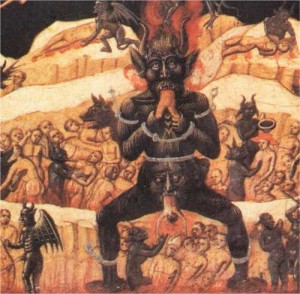 What to today’s Satanists believe?
What to today’s Satanists believe?
The Economist sets out to explain:
Satanists are a rather fractious bunch, with many different organisations, beliefs and rituals. Many of these organisations are wholly or partly occult, with much hidden from non-adherents. Some are spiritualists: they worship Satan as a deity. Adherents of the Joy of Satan Ministries, for instance, “know Satan/Lucifer as a real being”, and believe he is “the True Father and Creator God of humanity”. Others—notably the Church of Satan, founded by Anton LaVey, the most renowned occultist since Alesteir Crowley; and the Satanic Temple—are materialist, and reject belief in supernatural beings. Lucien Greaves, a spokesman for the Satanic Temple, describes himself as “an atheist when it comes to supernatural beliefs”, and says that for him Satanism stands for “individual sovereignty in the face of tyranny, and the pursuit of knowledge even when that knowledge is dangerous.” LaVey’s “Satanic Bible” proclaims “Life is the great indulgence—death the great abstinence! Therefore make the most of the HERE AND NOW!…Choose ye this day, this hour, for no redeemer liveth!”
Despite these differences, certain commonalities link many spiritual and materialist branches of Satanism: namely a belief that the worship of a supernatural deity—and the ecclesiastical structure that evolved to support such worship—places needless restrictions on human knowledge and progress; and a belief in science, rationality and learning, without restrictions. Peter Gilmore, LaVey’s successor as head of the Church of Satan, distinguishes between “carnal people and spiritual people”: he believes the latter need a “spooky daddy in the sky”, whereas he is “happy being the center of [his] universe”. In this sense, materialist Satanism seems close to, if not indistinguishable from, organised atheism, or perhaps atheism with rituals. But Mr Gilmore says his church uses Satan in the original Hebrew sense as “The Adversary”—”a figure who will stand up and challenge”. Satan in this sense becomes a sort of literary figure or metonymy for challenging orthodoxy, rather than an evil or bloodthirsty god.
Hmmm, maybe. But this all seems a touch, well, sanitized to me.
